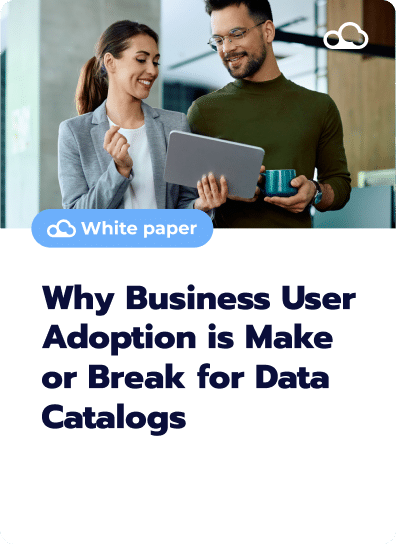Metadata is the key to managing data - But what's the key to metadata management?
Despite its importance, many organizations struggle with metadata management. The most common culprits are lackluster standards, incomplete lineage, and tools that make metadata management way harder than it should be.
The good news? These problems have a solution.
What is metadata?
Metadata is "data about data" - Information that helps you find and understand the most relevant data for any task. There are three basic types of metadata:
Descriptive metadata
Structural metadata
Administrative metadata
Data assets don't necessarily contain all three. Some may only include descriptive detail, while others might require structural or administrative metadata for governance or integration.
The bottom line is that metadata tells you exactly what you need to know about your data assets to find exactly what you’re looking for.
The role of metadata in data management
Data management systems, including data catalogs, use metadata to organize data. Metadata management categorizes datasets, defines their structure, and enforces the right standards on the right data.
Metadata records data lineage and describes dataset relationships. It encodes governance rules and captures business definitions, ownership, and usage policies: Everything essential for making data discoverable and ready for use.
Metadata management vs. data governance: What’s the difference?
Metadata management and data governance work together but play different roles. Metadata management structures and maintains metadata, while data governance defines policies and controls to ensure compliance and usability. However, governance relies on quality metadata.
Conflicting definitions, misaligned classifications, and incomplete lineage prevent governance from accurately applying its policies. Variations in naming, tagging, and access rules create gaps that governance can't fix, leading to enforcement failures and compliance risks.
To avoid pitfalls like these, organizations must tackle three key metadata challenges head-on.
CDO Masterclass
Join DataGalaxy’s CDO Masterclass to gain actionable strategies, learn from global leaders like Airbus and LVMH, and earn an industry-recognized certification. This immersive program equips data professionals to drive impactful, data-powered transformations.

Overcoming the 3 most common metadata management problems
Difficulties managing metadata usually involve three common issues: A lack of uniform standards, inadequate data lineage practices, and management tools that either don't help or make things worse.
Let's look at each of these problems and learn how DataGalaxy can help overcome them.
1. Lack of metadata standardization
As companies grow, different teams define and document metadata in their own ways. Even minor inconsistencies in metadata can lead to data silos, failed integrations, and wasted time searching for the right information.
- The fix: Establish clear, organization-wide metadata standards, taxonomies, and governance rules. Enforce consistency with automated tools.
- DataGalaxy’s solution: DataGalaxy eliminates metadata chaos using our suite of platform tools: Business Glossary, Data Dictionary, and Data Lineage tracking that bring clarity, consistency, and governance to everyone.
- Business Glossary: Defines business terms in a way everyone understands, including their use in metadata.
- Data Dictionary: Documents technical definitions, attributes, and relationships used in metadata.
- Lineage tracking: Maintains metadata in one format, in one place.
Together, these tools create a single source of truth, making metadata discoverable, accurate, and usable across the organization.
2. Insufficient data lineage
Without automated lineage tracking, teams must manually piece together data flows - A slow, error-prone process that obscures data origins, transformations, and dependencies. This can cause metadata to become incomplete, inconsistent, and unreliable.
- The fix: Automate data lineage tracking to determine exactly where data originates, how it changes, and who is responsible.
- DataGalaxy’s solution: We bring order and reliability to metadata by automatically mapping data flows and tracing dependencies in one standardized format. This eliminates the gaps and discrepancies frequently found when individual teams use manual processes to document lineage.
3. Unfriendly data management tools
Most metadata management tools are built for technical users, leaving business teams to choose between struggling with complex interfaces or relying on IT for everything. The result? Incomplete, poorly maintained metadata that fails to support real business needs. And a lot of unhappy people.
- The fix: Metadata management tools should be intuitive and easy to use, designed to appeal to all users, not just data experts.
- DataGalaxy’s solution: Our platform makes metadata interactive, intuitive, and actionable. Designed for both business and technical users, DataGalaxy transforms metadata from an isolated IT function into a shared business resource.
Our user-friendly, no-code interface lets everyone access, enrich, and easily use metadata within their workflows. Book a demo now.
Your data,
revolutionized









